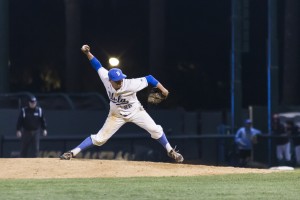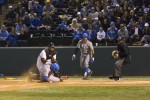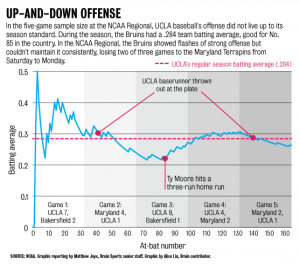Senior closer David Berg could hardly hold back his tears.
Thousands of hours of work all came down to one game in Jackie Robinson Stadium on Monday night. The Bruins’ regular season accomplishments – their Pac-12 title, their school record for conference wins, their first-ever no-hitter – were all in the past. The seasons – and the careers – of many, including the record-setting Berg, hung in the balance.
After just over three hours, Berg and the Bruins did everything they could. It just wasn’t enough.
No. 1 seed UCLA lost to No. 3 seed Maryland 2-1, and the Bruins’ season was suddenly over.
“I guess I’m not disappointed … in the way that we worked. We did everything we could,” said Berg, who pitched two scoreless relief innings with three strikeouts. “Unfortunately, we are playing a really tough game of baseball where the best team … may not always win.”

Baseball can sometimes be a game of chance, and Berg said “things can end quickly” for any team that enters the NCAA Tournament. Take Oregon State, the No. 1 overall seed in the NCAAs last year, for example. That Beavers team finished the regular season 42-12 and won the Pac-12, proving its worth over the long haul. But over a four-game sample size in the NCAA Regional, Oregon State lost twice to a lower-seeded team, and it was ousted from the postseason.
As this year’s No. 1 overall seed, UCLA (45-16) had its season come down to an even smaller sample size: one play.
In the bottom of the second inning, UCLA held the first scoring opportunity of the game in its hands, with a runner on third base and one out. This turned out to be one of the few scoring chances in a game dominated by pitching and defense.
“With that kind of pitching on both sides, runs are really gonna be hard to come by,” said UCLA coach John Savage.
With the increased value of one run in mind, redshirt sophomore catcher Darrell Miller Jr. tagged up from third base and sprinted home on a fly out to medium-deep center field. When Miller Jr. was tagged out just inches in front of home plate by Maryland’s catcher, everything started to go downhill for the Bruins.
UCLA went 3-for-23 at the plate after that play, and only had two more runners advance as far as third base for the rest of the game.
“We were shut down offensively,” Savage said. “That’s what good baseball’s all about – it’s pitching and defense. We’ve proven that. So you live by it and you die by it sometimes. And unfortunately, (Monday), we got beat.”
UCLA’s pitching staff held strong, allowing only five Maryland baserunners to reach third, and just two of those five scored. The Bruin defense held its own as well, ending the game with no errors.
But no matter how well UCLA’s pitchers and defenders performed, they were constantly playing from behind. After UCLA missed out on the game’s first scoring chance in the second inning, Maryland (42-22) took a 1-0 lead in the fourth and never trailed after that.
“Hats off to Maryland, they kept us off balance for the most part,” said redshirt junior shortstop Kevin Kramer. “We didn’t capitalize when we had guys on base. … We did a good job (Monday). We just didn’t produce offensively enough for us to win.”
Despite all of the missed opportunities earlier in the game, UCLA still had one final chance in the bottom of the ninth inning with two outs and the tying run at third base.
On a 2-2 count, Miller Jr. watched a 77 mph curveball float over the plate. Miller Jr. didn’t swing, leaving the season up to an umpire’s call.
The umpire ruled strike three, and UCLA’s season was over.

